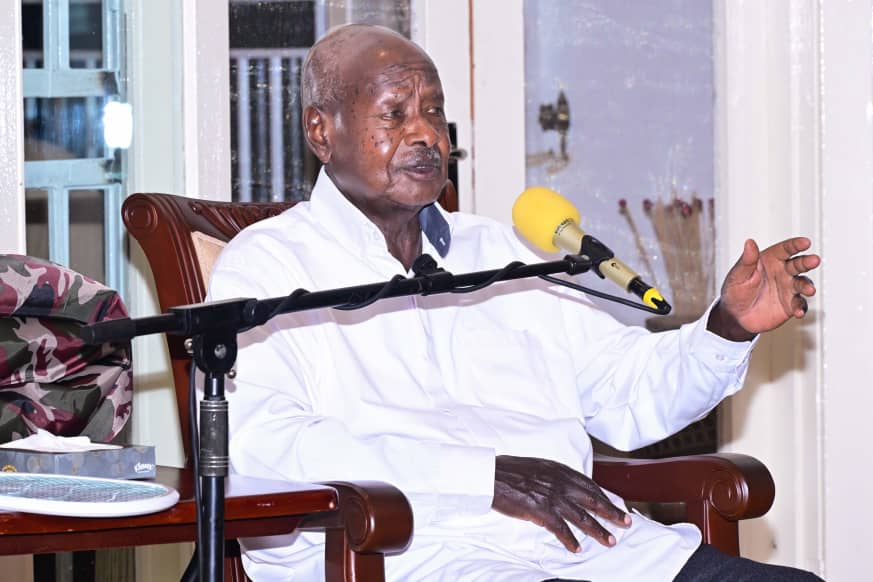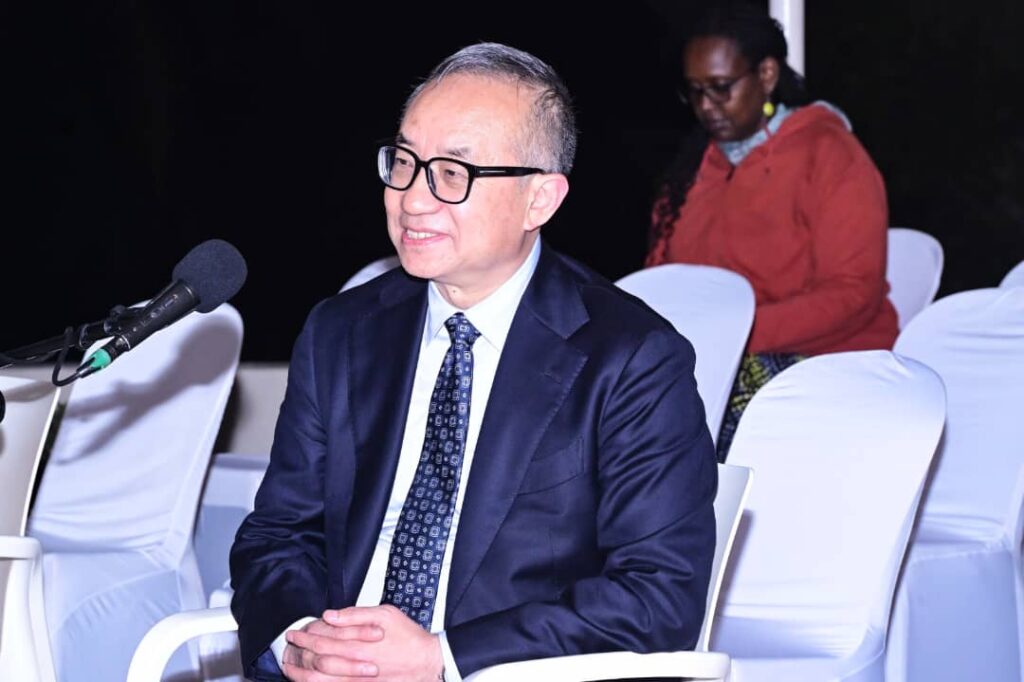
MBALE. President Museveni, on Friday, 7th November, 2025, met with Mr. Guang Cong, the United Nations Secretary General’s Special Envoy for the Horn of Africa, at Mbale State Lodge, where the two leaders held in-depth discussions on regional security, the Nile River disputes, and broader geopolitical challenges affecting the Horn of Africa.
Mr Cong, who was appointed by UN Secretary-General António Guterres in July 2025 to succeed Ghana’s Hanna Serwaa Tetteh, expressed appreciation for the opportunity to engage President Museveni on strategic regional matters. He said his mission as an envoy was to better understand the challenges in the Horn of Africa and explore ways the United Nations could add value to ongoing peace efforts.
“I would love to hear from you about your assessments of the challenges facing the region and what we can do, where you think you and the United Nations can add value to the ongoing efforts to address all the challenges facing this area,” said Mr. Cong.
President Museveni, a long-time advocate of Pan-Africanism and unity, told the UN envoy that the persistent instability in the Horn of Africa and other parts of the continent is deeply rooted in ideological bankruptcy and opportunism among political actors.
He explained that most conflicts in the region arise from leaders who base their politics on identity (tribe, religion, or race), instead of addressing people’s material needs, such as food security, income, and peace.
“Because they are ideologically bankrupt, they use politics of identity – tribe, religion, race – like in the case of Sudan. That’s how they broke it up, trying to emphasize Arabism and Islam on everyone when the people were diverse and different,” President Museveni said.
He drew parallels with Uganda’s own history, noting that the country, too, once struggled with sectarian divisions before the National Resistance Movement (NRM) introduced a unifying ideological framework during the 1960s student movement.
According to Gen. Museveni, the mixture of “bad politics and bad methods” has entrenched violence in several African nations, particularly those where leaders fail to build strong national institutions like armies and police forces capable of defending their countries without external help.

“If you divide people into sectarian groups, you can’t form a national political party. You can’t create national institutions like the army or police. That’s why some of these states depend on foreigners or the United Nations to defend them,” he said.
President Museveni illustrated Africa’s deep-rooted cultural diversity, emphasizing that differences in beliefs and traditions should not lead to conflict. He recounted a personal conversation he once had with former Sudanese leader Omar al-Bashir about religious tolerance, using his own cultural practices as an example.
“I told Bashir that my list of haram (forbidden things) is much longer than his, but I don’t talk about it. I don’t eat fish—I call it a snake. I don’t eat sheep or chicken because I believe it causes instability. But this is my culture, and I respect others who eat them,” President Museveni shared humorously.
He explained that in his community, chickens are kept for traditional spiritual purposes, not for consumption, but this does not create conflict with communities such as the Baganda, who commonly eat chicken.
“Most Muslim youth are copying nonsense from the Middle East, judging others for what they eat. If someone eats pork, has he put it in your mouth? No. So, how is it your problem?” he said, stressing the importance of mutual respect and coexistence among Africa’s diverse people.
The President underscored that Uganda’s interventions in regional conflicts, such as in Somalia, are guided by the principle of African self-reliance and solidarity.
“We intervened in Somalia to teach that Africa belongs to us, and whoever wants to be here must respect everyone. If we are pagans, Christians, or Muslims, we must live together. The problem is internal, worsened by foreign interference and Europeans supporting bogus groups,” he asserted.
Turning to the situation in South Sudan, President Museveni said Uganda’s involvement was primarily aimed at preventing state collapse, which would have caused immense suffering and regional instability.
“This is the same problem of sectarianism—originally between Arabs and Africans, and now among African tribes themselves. Our position has been to stop a collapse because that would be a disaster,” he said, further explaining that Uganda intervened in 2013, and again recently, to advise President Salva Kiir on maintaining national unity and pursuing peaceful political solutions.
“There were problems within the SPLM itself, and differences between Salva Kiir and Riek Machar. But there’s really no unsolvable problem. The country belongs to the people. If you have political disagreements, why not go for elections and let the people decide?” H.E. Museveni advised, pointing to Kenya’s democratic processes as an example of managing divisions peacefully through elections, rather than resorting to violence.
Mr. Cong also sought President Museveni’s views on how to address the growing tensions between Egypt and Ethiopia over the Nile River, which have long been a source of diplomatic friction.
In response, President Museveni said that the real threat to the Nile is not political rivalry but environmental degradation and the lack of socio-economic transformation across the Nile Basin countries.
“The danger to the Nile is the increasing population, which is poor and backward. They depend on biomass for cooking, cut forests, and destroy wetlands through primitive agriculture. If you care about the Nile, you should focus on transforming the economies in the catchment areas,” President Museveni explained.
He emphasized that modernizing agriculture, industrializing economies, and improving energy access are essential to reducing environmental damage that threatens the river’s flow.
Citing data from past decades, President Museveni noted that the volume of water flowing from Uganda to Sudan had dropped from about 60 billion cubic meters in 1964 to roughly 40 billion cubic meters today due to deforestation and reduced rainfall.
“So, where has the 20 billion gone? It’s because of environmental destruction and less rain. That’s what people should be discussing,” he said.
President Museveni urged regional leaders to broaden their perspective beyond the Nile, pointing out that the Congo River, with 3,000 billion cubic meters of water, presents untapped potential for regional cooperation and shared prosperity.
“You’re quarreling about the Nile’s 85 billion cubic meters, yet the Congo River has 3,000 billion cubic meters. If there was peace, the water entering the ocean every minute would be enough for all of us,” the President argued.
President Museveni emphasized that Africa’s path to peace and prosperity lies in ideological clarity, unity, and leadership that prioritizes people’s real needs over power struggles.
Mr. Cong thanked President Museveni for his insights, saying he valued Uganda’s long-standing role in peacebuilding efforts in the Horn of Africa.
“Thank you so much, Your Excellency, for the opportunity to meet with you. I wish you and the people of Uganda a very successful election,” the UN envoy said.
Mr. Cong, a Chinese diplomat with vast experience in multilateral and regional affairs, took office in July 2025 as the new UN Special Envoy for the Horn of Africa, tasked with advancing peace, stability, and cooperation in a region long affected by conflicts, resource competition, and external interference.
The meeting was part of Uganda’s continued engagement with international partners to promote peace, stability, and socio-economic transformation in the region.